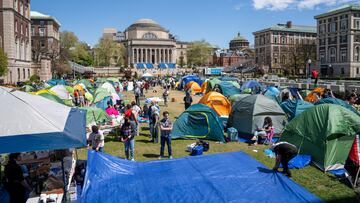What are the pro-Palestinian protesters arrested at universities charged with? Are the protests illegal?
University students protesting the Israeli military operations in Gaza have been arrested at several campuses across the US over safety and security fears.

Protests continue to spread across the nation at universities over Israeli military operations in Gaza. Encampments have popped up on campuses and sit-ins have occupied buildings nationwide.
Generally, the pro-Palestinian protesters are calling on their centers of higher learning to divest from Israel and military weapons manufacturers supplying armaments in the deadly conflict that exploded in October. Despite being peaceful for the most part, with unaffiliated individuals being broadly blamed for offensive rhetoric and acts of violence, tensions have nonetheless been increasing on campuses.
Citing safety and security concerns, administrators at some institutions have called on the police to disburse the mass gatherings. This has resulted in hundreds of students and faculty members being arrested across the country at several universities.
What are the pro-Palestinian protesters arrested at universities charged with?
The majority of the pro-Palestinian protesters arrested at universities have been on charges of trespassing, and in a few instances one or more individuals for obstructing officers from carrying out their duties.
That was the case in early April at Pomona College in southern California where 20 students were arrested. According to The Student Life, the Claremont Colleges student newspaper, 19 student protesters were charged with trespassing and one “was held on a charge of obstructing/delaying an officer.”
Spectator photographers captured the flurry of political and academic activity on and around campus as the “Gaza Solidarity Encampment” reached its sixth day. Explore pivotal moments of faculty walkouts, press conferences, Passover celebrations, and more. https://t.co/8urBmHy2ED
— Columbia Daily Spectator (@ColumbiaSpec) April 25, 2024
Last week, the Columbia student newspaper reported that the NYPD arrested over 100 students. All of them “were charged with trespassing, and two were additionally charged with obstruction of governmental administration.” This came after University President Minouche Shafik “determined that the encampment and related disruptions pose a clear and present danger to the substantial functioning of the University” and authorized the police to come onto campus to clear the South Lawn.
Other arrests have occurred at Yale university, where 47 student protesters that refused to vacate Beinecke Plaza were arrested, charged with trespassing and then released on Monday. Later that same day, 120 students and faculty were arrested at NYU on similar charges.
On Wednesday it was reported that over 30 protester were arrested at the University of Texas Austin and nearly 100 at the University of Southern California after dispersal orders were issued.
A photojournalist, identified as Carlos from Fox 7, was detained and arrested by the the Texas Department of Public Safety trooper (DPS) while covering a pro-Palestine protest at the University of Texas in Austin, Texas.
— Middle East Eye (@MiddleEastEye) April 25, 2024
According to reports, Carlos was charged with criminal… pic.twitter.com/99JcD1AQrL
Are the pro-Palestinian campus protests illegal?
While the act of assembly and peacefully protesting to express any viewpoint is protected under the First Amendment to the US Constitution, it must be carried out in a public space or public forum. Such public spaces include parks, public squares, sidewalks and streets but private property is excluded, and protesters generally have to follow certain rules.
Related stories
Authorities may enforce some restrictions as well as laws to maintain peace and order in their jurisdiction. Additionally, universities like Columbia, Yale and USC are private institutions and thus their property is private as well, which means that the administration has the right to determine when someone is trespassing.
As for public schools, courts have ruled that administrators can limit access to what is essentially public property during the school day if “boisterous and threatening conduct… would interrupt the peace and quiet and disturb the tranquility required for the academic aspects of a school’s function.”



Complete your personal details to comment